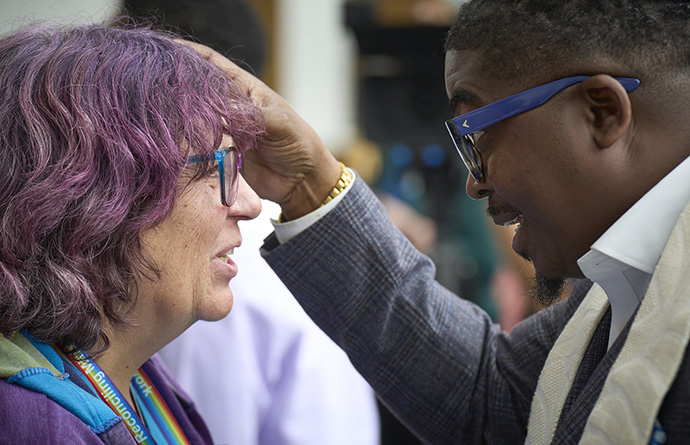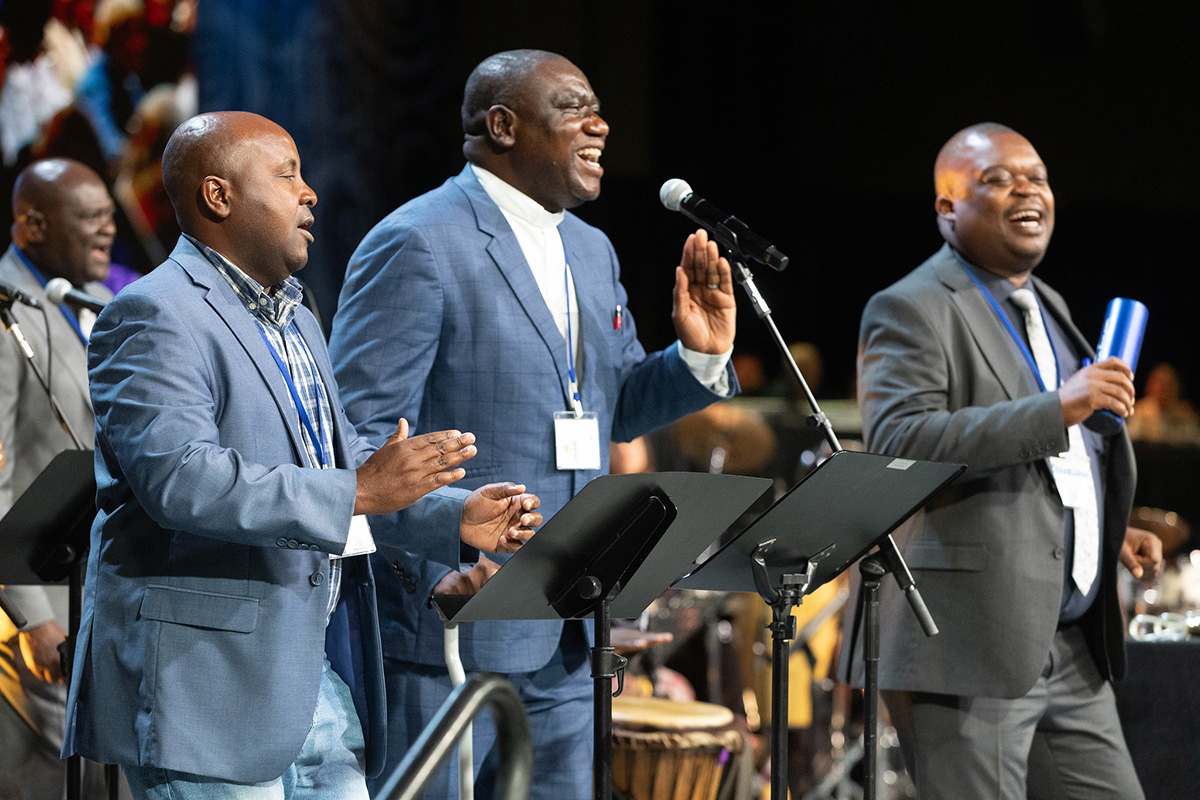Key points:
- A sense of calm optimism pervaded General Conference at the close of the first week.
- Delegates, pages, observers and others said the mood was markedly different than that at past General Conferences.
- One observer said, “We’re working together amicably, and there’s a real sense of the body moving toward a shared goal.”
The familiar feeling of frustration in his gut is noticeably absent for the Rev. Kevin Young, who has attended every General Conference since 2008.
The pastor of First United Methodist Church of Montrose, Colorado, is starting to think he might finally go home from General Conference satisfied with the results. He is attending as an observer.
“I’m just really hopeful that we’re going to turn a corner,” said Young, whose long hair, beard and glasses give him a serious Jerry Garcia vibe. “I’m depending on people who are counting the votes much more closely than I am,” he said.
“And, of course, no one knows for sure, but everything I’ve heard at this General Conference seems united in a desire to move forward and to put some really awful things behind us.”
As General Conference passed the rough halfway point April 26, progress had been made in committee meetings related to what used to be the third-rail issue of sexuality. The mood was mostly upbeat in a very unscientific survey of delegates, pages, observers and other interested folks.
Subscribe to our
e-newsletter
“I feel that we’re going good in this General Conference, that our voices are being heard — the progressives and even me as a traditionalist,” said Lucille Grace Hilario, a lay delegate and director of connectional ministry in the Middle Philippines Conference.
Thomas Kemper, former top executive of the United Methodist Board of Global Ministries and a consultant for Wespath Benefits and Investments, said 2024 “is day and night to all the conferences I’ve experienced before.”
“I love it,” Kemper said. “There’s so much grace, so much real fellowship and trying to discern among Christians, which I had not seen before. I’m very happy about it.”
Sung-ok Lee, connectional officer of United Women in Faith, said she was “pretty amazed at the way things are moving well.”
Lee is monitoring legislation related to United Women in Faith, and any legislation that relates to women, children and youth.
“We are here to make sure women’s voices are heard,” Lee said.
“Most of the petitions in regionalization are passing, and the atmosphere seems somewhat different than past General Conferences,” she added. “We’re very pleased at this point.”
Last week, General Conference passed much of the legislation that aims to give The United Methodist Church’s different geographic regions equal standing in decision-making. Under the regionalization legislation, the U.S. and each central conference — church regions in Africa, Europe and the Philippines — would become regional conferences with the same authority to adapt the Book of Discipline, the denomination’s policy book, for more missional effectiveness.
The legislation would allow conferences to make their own rules regarding the role of LGBTQ people in the church, including whether they can get married in a United Methodist church and be ordained as pastors.
The Rev. Troy Comstock, pastor of Servants of Christ United Methodist Church in Houston, is attending his third General Conference as an observer.
“There is a different mood and a different feel,” he said. “This feels a lot more peaceful and more amicable than previous General Conferences.”

Comstock, who works with Reconciling Ministries to help LGBTQ people feel welcome in the denomination, sees a greater feeling of equality this time.
“We’re not at each other’s throats,” he said. “We’re working together amicably, and there’s a real sense of the body moving toward a shared goal.”
Some attendees are concerned with issues that are generating less attention.
“One thing I listened to was an anti-bullying resolution,” said Karen VanMatre Smith, a newly consecrated deaconess from Menard, Texas, and a General Conference observer. “It may not be the most important thing we’re doing in our entire conference this year, but it might be important to one kid or to several.
“I think it’s important that we get the nuts and bolts right, and I like that we’re involved in society.”
Other lesser publicized efforts at General Conference include apologies for sexual abuse involving the denomination and the overthrow of the Hawaiian Kingdom in 1893 with help from Methodists, including President William McKinley.

General Conference photos
In addition to changing language in the Social Principles regarding sexuality are other recommendations condemning governments using coercion — including extrajudicial killings — to silence political opponents, reaffirming the denomination’s longtime opposition to the death penalty and affirming health care as a basic right.
There also is an effort to call the denomination “The United Methodist Church” whenever referenced, banning using just “Methodist.” That would differentiate the denomination from other denominations who use “Methodist” in their name.
The people attending General Conference are “a good mix,” said the Rev. Andrea King, pastor of Emmanuel United Methodist Church in Beltsville, Maryland. She is attending as an observer.
“There are some older people that have been around for a while, and there are several newer people that are coming in,” she said. “So, you can sort of see the ebb and flow of the demographic.”
King said that good planning by the committees and subcommittees is paying off at the Charlotte Convention Center.
“They’ve been doing that work very diligently,” she said, “so things are moving along at a good pace from our understanding.”
For Filipino delegate Hilario, the regionalization legislation is key for maintaining unity in the denomination.
“We have different principles,” she said. “We are very conservative in the Philippines. … We believe what the Scripture is saying about marriage, that marriage is between a man and a woman.
“It is best not to make us divided,” she said. “(Regionalization) would make our conversation more open.”
On the bright side, Grace sees no other conflicts once conferences can make their own policy regarding sexuality.
“I think that’s the only issue that I am not comfortable with,” she said. “Other than that, everything is OK.”
Patterson is a UM News reporter in Nashville, Tennessee. The Rev. Thomas E. Kim contributed to this report. Contact him at 615-742-5470 or [email protected]. To read more United Methodist news, subscribe to the free daily or weekly Digests.




